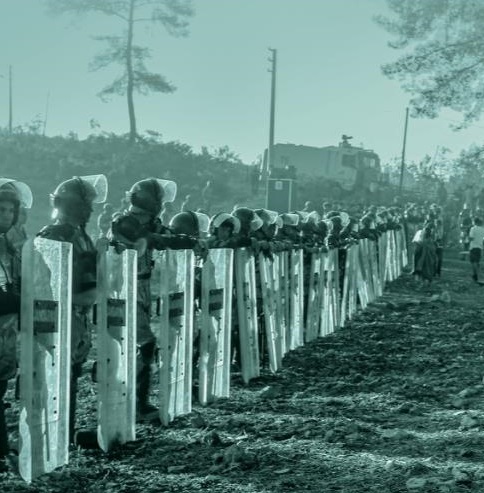Gisèle Pelicot, 72 years old, has won so much admiration and respect for the way she handled the judicial process concerning the gang rape of which she was the victim, that she has become a symbol of courage in recent years, going beyond 2024. “Shame must change sides” she said, “it's not us who should be ashamed, it's them. I don't want any woman who has been raped to feel shame anymore."
As we approach the end of 2024, various publications and organisations will choose their ‘best’. However, on different social media channels, peoplefrom all over the world, especially women, cite her for “the person of the year.” Gisèle Pelicot, 72 years old, has won so much admiration and respect for the way she handled the judicial process concerning the gang rape of which she was the victim, that she has become a symbol of courage in recent years, going beyond 2024. “Shame must change sides” she said, “it's not us who should be ashamed, it's them. I don't want any woman who has been raped to feel shame anymore." Gisèle Pelicot became a heroine who encouraged all women who had to live with different doses of everyday violence, especially those who were sexually assaulted by drugging.
More than 20 thousand videos
It boggles the mind, but the dozens of men who are the perpetrators, who know, who remain silent, are just as real. Dominique Pelicot, Gisèle Pelicot's husband of 38 years, whom Gisèle Pelicot married in the 1970s after falling in love with him in the 1970s, drugged his wife's food and drink for ten years from 2010 onwards, rendering her unconscious. First he raped her only himself. He then organised at least seventy-five men he contacted online to rape his unconscious wife in their own homes. The perpetrators included firemen, journalists, unemployed and retired men. He recorded and collected these rapes. From then on, Gisèle Pelicot's body, which had complained that she was always sleepy during the day, no matter how much she slept, began to send signals in rebellion against the serial rapes that took place while she was unconscious: She was having gynaecological problems, she was getting thinner, her hair was falling out, her memory was not what it used to be. She always attributed all this to some other grave illness or to ageing.
If Dominique Pelicot hadn't been caught filming another woman under her skirt in a department store in 2020, if that salesperson hadn't gone after her, and if the police hadn't examined her mobile phone and computer, all of this would never have come to light, perhaps for a much longer time, perhaps never. He recorded more than 20,000 videos of abuse. The facial recognition system identified 54 perpetrators aged between 27 and 74, the rest remained anonymous. In September 2024, the first trial took place.
If Dominique Pelicot hadn't been caught while he was filming another woman under her skirt in a department store in 2020, if that salesperson hadn't been on the case and if the police hadn't examined his mobile phone and computer, all of this would never have come to light, perhaps for a much longer time, perhaps never. He recorded more than 20,000 videos of rape. The facial recognition system identified 54 perpetrators aged between 27 and 74, the rest remained anonymous. In September 2024, the first trial took place. Dominique Pelicot had already confessed. Even more outraging detail was the fact that some of the other men who are being judged said that they had not realised that the woman they had raped was conscious or not. Some apologised to her in the dock, but there were others who claimed to have been victims themselves; they said they had been deceived. All the messages, from the purchase of the drug to all kinds of rape ‘jokes’, are in the file.
In such cases, women may justifiably wish to remain anonymous, but the ‘masculinity’ that permeates the functioning of the judiciary and then having to go on with one's life under that name may lead women to prefer invisibility; remaining anonymous is a right. Gisèle Pelicot gave this up by taking a risk of her own. She insisted on using Pelicot specifically because she wanted her grandchildren not to be ashamed of this surname.
She also demanded that the rape footage be shown in the courtroom; she said that she wanted to look into the eyes of the perpetrators in the courtroom while the footage was being shown. She wanted to confront this sexist system starting from the first meaning of the word. This time, that moment when both parties were conscious, that moment of encounter, would change her from victim to judge. This was a victory in itself.
Not bad, not sick, not isolated
This couple, who had three children and many grandchildren, were considered exemplary by their neighbours. The shocking nature of the offence and the disgust it arouses create a feeling in many people that this is an isolated case, and make them say “this is too much.” Even if it is not exactly the same, it does happen. Her husband, Dominique Pelicot, is not a “sick” man; what drove him to this crime is not an “evil” whose source is detached from this world. The small French town where all this happened is just a small model for the rest of the world where violence against women has become commonplace, where rape can be seen as a form of sexuality; it forms the core of this case file as the most basic motif of this order built on internalised hatred of women and glorified displays of masculinity.
This week, in that courtroom in Avignon, the defendants are taking their final defence, and then the verdict will be delivered. Gisèle Pelicot will continue her life under her maiden name. She will be remembered for a long time for her refusal to surrender to the devastation of her experiences, for standing up from the centre of the devastation and reaching out her hand to other women. In front of the eyes of the whole world, shame has indeed changed sides.
(Printed in Agos, 19.12,2024)





